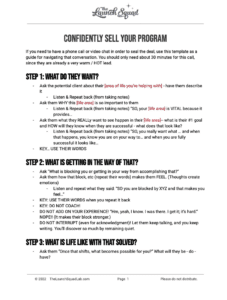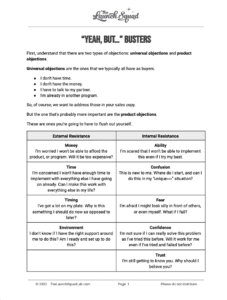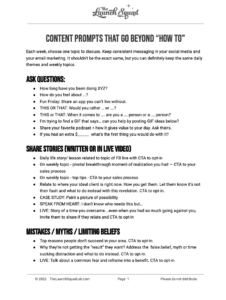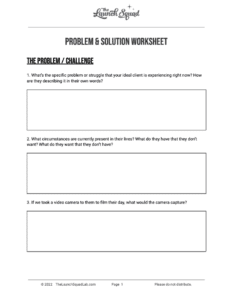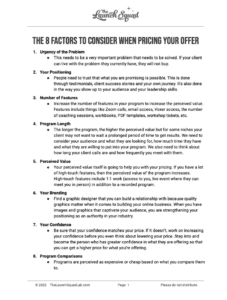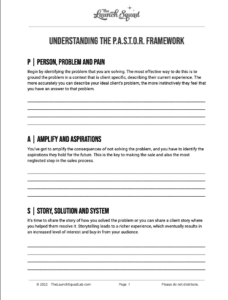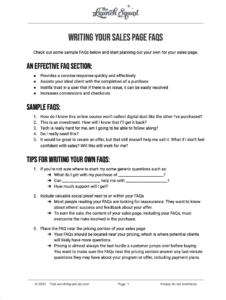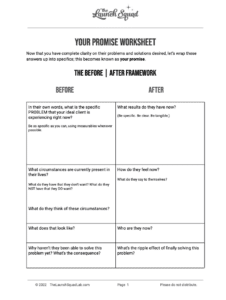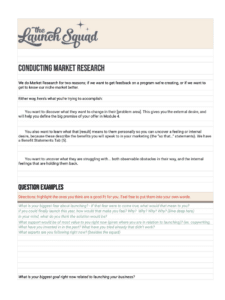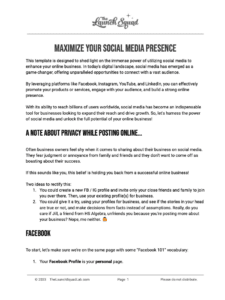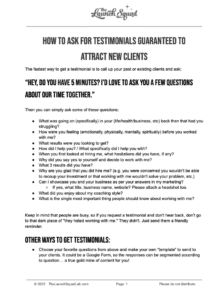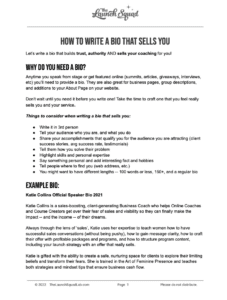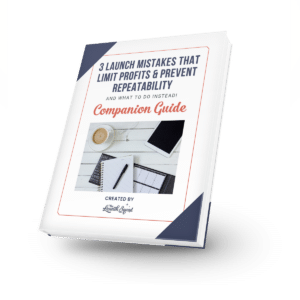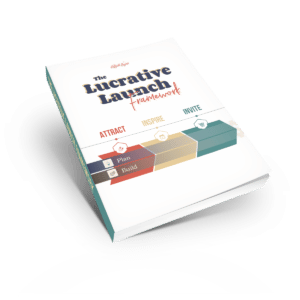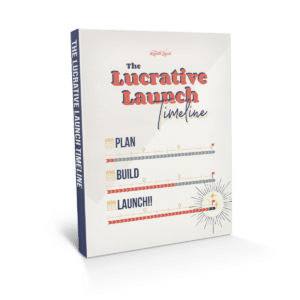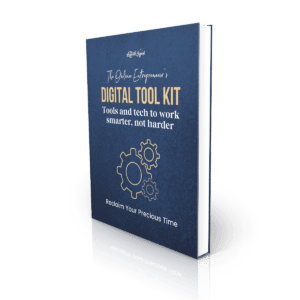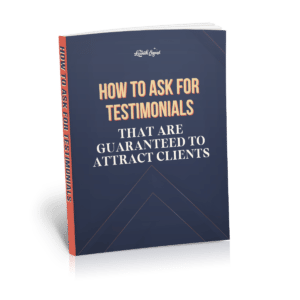This is the pep talk you didn’t know you needed! On today’s episode, we take a deep-dive into what it really means to become the CEO of your own business. This goes way beyond the CEO title. Learn 3 things you can do right now to help bring the bigger vision of your business to life. Join us as we talk about how to get out of the “struggle zone” and into a thriving business.
Jeffrey: Welcome to the light in your launch podcast today, we're talking about becoming the CEO. Your business needs you to be with Hillary Johnson, stay tuned.
Announcer: Hey, we're in the Launch Squad and this is the Light Your Launch podcast. We teach coaches and course creators how to lighten their launches. We're bringing you all of the tips and strategies to take your launch from intimidating to money-making. In this podcast, we talk about everything; the sales, strategy, mindset, technical and spiritual aspects of running your best launch ever. So if you're feeling overwhelmed and unsure of the next right step, we're here to bring clarity, confidence, and excitement into your next launch. This is the Light Your Launch podcast.
Katie: All right. Welcome back to the show. I'm Katie Collins with Jeffrey [inaudible]. And today we want to talk about becoming the CEO that your business needs you to be. And we have a very special guest today. So we are sitting here with Hillary Johnson and she is a business growth coach, founder and CEO of hatch tribe. Her company helps women entrepreneurs build thriving businesses by learning how to step out of the entrepreneurial struggles zone and become brilliant CEOs. Hillary is a keynote speaker and author of a girl's guide to surviving the startup with your mind, body and soul intact and encouraging, read that imparts road, tested wisdom for tackling the inner and outer work of being the boss. When she's not working, you'll find her traveling the world with a single carry on bag and hunting down the best bakery in town. She lives by the mantra live loud, eat well travel often. So welcome to the show, Hillary, thanks so much for having me and so happy to be here. Yeah, we're psyched to have you here. Um, so I can't wait to dive into this very important conversation, but, um, you know, take a, take a few minutes and just let us know. How did you get to be kind of the expert on CEOs? What's your, what's your story sister.
Hilary: Yeah, right. It's it's that road tested wisdom it's, it's been earned like through all the highs and all the lows that just don't stop, you know, even 10 years into owning businesses. Now I can say it still happens, but I think that that's, that's the joy of it. And I think being really present for all the things that I've learned through the years of owning multiple businesses, you know, has really empowered me to do the work that I do. So I guess for, you know, a little brief history of it, the first 10 years of my life, I worked in the corporate world and always had a dream of kind of doing my own thing. And so 10 years ago I left Chicago, took a one-way flight and moved to Charleston, South Carolina. And I started my very first business producing, really large scale festivals and events for thousands of people.
Hilary: And that was the first and then several others followed, but hatch tribe really came on the scene about six years ago. Um, the intention there was, I wanted to create what didn't exist when I started my first business and what didn't exist was true community and true support. And, you know, especially being a female entrepreneur because in Charleston at the time, like, remember this is before co-working at least in our city. And it was before lots of women centric, uh, entrepreneurship groups existed. And so I thought, man, like, where are the people like me? I want to know them. I want to learn from them. I want to be like them. So, uh, built it and you know, of course it's evolved over the years, but that's, that's really where it got its start was. I wanted to create what wasn't there and that I desperately wanted.
Katie: Awesome. I mean, you've built a very impressive collective, um, it's, you know, been a pleasure of mine to be a part of it. And, you know, I, I always think back to this ridiculous conversation I had on a first date with a man. And when I told him what I did, which was something to the effect of, I help women overcome their fear of sales, um, yada yada, and he responded isn't that sexist.
Katie: I don't know why I didn't just pivot on my heels at that moment and ended the date. But, um,
Katie: That just goes to show you, you know, just that lack of understanding of how difficult it can be. Um, just being a woman on her own, trying to figure things out in what used to be known as a man's world, you know? And, um, I'm happy to say that I really feel like it's no longer a man's world. Um, but you know, I got started in business 10 years ago as well. And I know that a lot of the things that I originally learned prior to my heart centered sales that I picked up on, um, was just a very masculine approach and masculine strategy. And it just wasn't working for me. And I didn't have the right words to say, this isn't working for me. Instead. My words were, I'm a failure. I can't do this. And so it was so helpful to choose feminine role models and like hang out with women that were killing it. And so that I could see a model of people that looked and acted like me doing it a way that felt much more aligned. So I just love what you've built and I couldn't agree more that it's so important. And thank God, you know, six years later, as you say, things have definitely shifted in the right direction. So
Jeffrey: Well, and you're really, you're really embodying that, uh, definition of entrepreneurship, right? You're, you're, you're seeing something that doesn't exist. You're saying, I wish I wish this existed. Somebody should make this, somebody should do this. Oh, well, I'll do it. Maybe it should be. Yeah. Maybe, maybe I'll do it. There you go. That's what we do. We're problem solvers.
Hilary: Right. I mean, at the core that's really makes us good at what we do. So yeah. I was happy to, to be able to kind of fall into it, but also rise into it. I think it was one of those things that I discovered, you know, once I built it, I was like, this is what I'm meant to do. And if you'd asked me that, even when I started my first business 10 years ago, I mean, one, I would have never had the dream for hatch tribe that wasn't planted on my heart yet. And I wouldn't have had it as like a seed in my brain because I'd never would have had the construct or the concept of it. So I think it's one of those things of just embracing the journey of your own life and your own business, because it evolves and it changes and it changes you. And so it's like, as you go through it, you just be open to the possibility because there are possibilities that we can't see yet. Um, and there'll be here.
Jeffrey: I think that's so huge. That's such a great point. I'm just thinking about like, you know, somebody listening out there thinking, uh, my, my business is going to stay the same or I'm going to stay the same in my business or thinking right now. I can't think that far in advance, you know, like those kinds of ideas, what you're saying is like you're transform along the way. Yeah.
Katie: You totally do evolves. Yeah. I mean, I say that about sales. If you told me when I was teaching second grade making $27,000 a year miserable, um, you know, that I would be some sort of sales expert. However many years later I would have laughed. And even now to be the founder of the launch squad, co-founder Jeffrey here. Um, you know, that even three years ago that I would be leading a company, teaching people how to launch when, you know, three, four years ago, I was scared to death to do it myself. And I invested a lot of money in, in the support I needed, you know? And so yeah, things just evolve and it's so fun to even see my iteration of being a coach. I was a life coach helping you dream build, you know, then I was a career coach helping you get out of a job you hate and into one you love.
Katie: And then I realized, I didn't really want to get them into another job. I wanted to get them into their own business because that was the freedom that I had found quit the job you hate and start a business. So then I got into that iteration. So it's just really interesting. And I think one of the most important things, um, and I think this is related to being a CEO is giving yourself permission to change and to grow and to change your mind. Yeah. You know, um, to allow yourself to evolve. Like I wasn't, I wouldn't have claimed an expertise in that a couple of years ago, but now I can. And here's why, right. So I think that leads us into our first question we wanted to ask, um, what are some signs that you see that really show these business, not setting themselves up for that longterm success in business. I've got a few ideas of my own, but I'm curious what yours are.
Hilary: Yeah, for sure. I mean, I think what we'd like to point to is things that aren't working in this, in this case. Right? So inside of any business, there's always going to be some things that we can optimize, right? Like we can look at, what's broken with an email and be like, man, we've got to fix that. Or we can look at, you know, what's not working with a team member and be like, wow, we've got to clean up something with our communication. We're not getting the results we want, you know, we're fixers. We can see those things, but I think what tends to happen. And we're where we really can see that business owners are not setting themselves up for longterm success or the things that linger longer. And typically these are things that are like, they're, it's a feeling of like pure exhaustion or really feeling like you're in the struggle or you're like never digging yourself out of a hole or you're staying always behind or you're burnt out.
Hilary: Or you're just saying WTF all the time. So it's like, we want to actually, instead of looking now, external, it's kind of listening back internal and asking ourselves, and I think this is the question. Can I keep doing this? Like the way I'm operating today? Could I keep doing this for 10 more years? And if that is, no, we are not building a sustainable business because you, as the CEO in it, can't sustain it. You can't keep going at that pace. You can't keep doing it the way that you're doing it. You know? So that's where we recognize something's got to change and it will always start with you as the CEO of your,
Jeffrey: Okay, we got to keep talking the back of this. Cause I've got a friend who needs to hear this. [inaudible] I'm going to send them this episode when it's done. Yeah,
Hilary: Definitely.
Katie: That is such a good question. You know, can I keep doing it this way or do I want to, and you know, I know, um, for, for Jeffrey, me and I'm sharing with you before we started the recording, um, you know, it was like one day I was, um, sort of a CEO, but I was a solo preneur. Right. So it was just like, yeah, I own my own business. And I, and I make decisions based on my own business. And then, you know, one day we woke up and decided to create the launch squad. And now we're, you know, a team of five, you know, a handful of owners. Um, we've got to get agreements in place, expectations in place. And then like you got to show up differently when you're on a team and you know, so maybe I'd let myself off the hook where now I'm a part of a team that's expecting me to have something done.
Katie: And I'm like, I gotta get that done. You know? And I, I thrive in that environment. I I'm really excited to be a part of a bigger collective than me, but I was kind of joking with someone the other day, like one day woke up and I was the CEO of a company that, you know, I, I don't know any, any new things than I knew the day before, but I have this new kind of crown on my head that says CEO and I need to really school. And so Jeffrey and I are, are taking this online training that I commonly refer to as CEO school. Um, and, you know, just figuring out like tax stuff. And, you know, we, we, our owners, um, two of us, two of them live in California and two of them live in Oregon. I live in Colorado, it was already like, so where do we set up our entity, which state, you know, and how do we open up a bank account without going in together?
Katie: And just all these things. Um, I don't know, just all these decisions that had to, that have to be made, but it's just when I was, um, sharing like about, you know, we're, we've got our sales goals for this year and then moving into, you know, I was saying to Jeffrey, like, we need to make sure our sales goals reflect the team. We want, you know, the, the people that we want to hire and what that's going to cost us and roll that into our goals. Um, I think that those are things that people forget, you know, people say, well, I'd love to get to $10,000 a month. Well, what does that mean to you? Is that enough, even though for you and your family, if you, if you had 10,000 your pocket every month, but people kind of forget it's are we talking revenue profit, like where, you know, um, just, are you planning for the business that you want three to five years down the road? Or are you reacting to what you need right now? And I think that's one of the biggest questions that people have to be able to, to answer with their CEO hat. Yeah. Well, I think
Hilary: If I can say one thing here, there's, there's two pieces. One is, you know, in most cases, CEO in, in, in, in the space of business owners is not a title we're given. You know, it's not something that is bestowed upon us. You know, it's really, it's not about the number of employees you have. It's not about the amount of money you're paying yourself. It is not amount about the amount of revenue you're generating your business. It is not about your tax structure. It doesn't have anything to do with that. It has to do with how you're showing up inside of your business. And if you're really taking that, that leadership role, you know, truly to heart, because we're not only leading our team, if we have a team, but we are really leading our audience and the people that we serve. And so it's like, it's understanding that you are the CEO, even if you are a solo preneur right now, and you're out there grinding and out, and it's just, you like, babe, you're the CEO of your life and your business step into that space because you have full ownership.
Hilary: And that's what it really comes down to is like, it is true accountability and true ownership for all the things that we're doing inside of our, our daily lives, because it's what you do every day. That's going to add up to tell us whether we get to that bigger vision. And that was the part too I wanted to add is like all of this stems from do we have very clear alignment to the vision we want. And for each one of us, even the three of us right here in this conversation, it's like, that's going to look different, like my vision versus Jeffrey's Katie's like, they all look different and what's important to me is that I'm really setting that very clear vision for myself and building my business in alignment with it. And it's like, that's where the clarity comes from. It's where the intention comes from. And that when that alignment's in place, a lot of other things become easier. It's the decision tree gets simpler. Yeah.
Jeffrey: Mm that's so good. I want to kind of linger here just for a minute because, um, I, I am fascinated in this, in that point of, um, this is kind of like this, the second question we've kind of want to touch on here actually is, is that is how do we get out of that struggle zone? And what I mean by that is in my, in my own pathway, I was working in a, uh, uh, kind of a partnership, but it was an unnamed partnership where, um, you know, there weren't agreements, there weren't, uh, things set in place. Uh, but it was, you know, two guys building a company together. Right. Um, and you know, towards the end of that, um, that relationship, uh, there became kind of, uh, my vision for where I think the company should go and his vision for where it should go and maybe, you know, they didn't always line up and they were a little different and, you know, so it was kind of like this, um, struggle between, do I just branch out on my own?
Jeffrey: How do I take this to the next level? Do I resolve the issues here? Do I afford, or, you know, struggle for that. And, and that's a little different, but it's sometimes the universe pushes you and forces your hand to do something. Right. But what about those instances where it's, it's not so cut and dry? Like, how do you, how do you break out of that struggle zone? How do you end up making the decisions to, um, you know, whether it's pivot your own entrepreneur company or quit your job to start your own company, or, you know what I'm talking about that, that bridge between like, Oh, I'm afraid to leave what I have, but I know what I want to do is so cool. It's so awesome. I can change the world, but I'm afraid to, you know, leave what I have. It's safe. It's comfortable.
Hilary: Yeah. I mean, th the, the story that it's making me think of is when, you know, I, I was working in the corporate world and I was living in Chicago and I, uh, was working very diligently on trying to come up with the business that I wanted to start, you know, and I'd gotten pretty far through the process. And one night I was on the phone with my dad and I was like, you know, I'm honestly just scared. You know, I was like talking to him about the being afraid of leaving my job, being afraid of going into the partnership at the time that I was, you know, being afraid of like picking up my life and moving across the country, letting go of a figure salary, you know, I was successful in all the things, but it was like, wow, you know, this is what I want to do.
Hilary: It's, it's, it's in my heart to do this, but I was terrified. And you know, my dad who has worked his entire life until he retired, basically for the same company, you know, he's a career guy, he's not a risk taker. And he was like, Hillary, you know, just at some point, you're going to have to take the leap. And I think it meant a lot coming from him, you know, from his perspective. And I think that the word that I use when I talk to my clients about this is courageous because in those moments, when it's unclear and we have them, no matter where we are in our business, or no matter where we are in our lives, um, there are moments that require us to have courageous conversations. Like the one you're talking about with the partner where you're like, man, we may not be on the same page.
Hilary: Um, there are times we have to make courageous decisions. Like for me, I I'd made the decision to exit my first business, you know, and that had a whole bunch of meaning attached to it. Or I'm using air quotes for meaning here. Um, like did it mean I was a failure? Do you know if I exited it and what if I didn't sell it, which I sold part, you know, and I didn't sell the other part. And what did that quote unquote mean? But it required a courageous act. And I think that in most cases we don't have, um, 100% clarity around all the things it's like, you just do the best you can. But I think this is where having a true written vision, you know, for your life can help delineate some of that. And I do think it needs to be personal vision first before it is a business vision.
Jeffrey: Hmm. What do you, what do you mean by that? Meaning
Hilary: Like, I want you like, say for you Jeffrey, I'd be like, what is it that you want out of your life when you think about like all the things like work is just one of them. So then it's like, what do you want personally? What do you want out of a relationship? What do you want out of like life and enjoyment? You know, where do you want to live in the world? What do you want to be doing every day? You know, it's like painting the robustness of our lives and all those buckets and all the things that we can be doing, um, and really having a vision for that, because you can build your business in any way you want, but it's like, if you said, for example, you know, I want to have, I want to get married and I want to have five kids and I want to live in this house and I want to stay in the city for the rest of my life. I'd be like, cool. We know what kind of business we want to build for that. But if you were like, I never want to get married. I want to go live in any country. I want every single month, I'm going to keep traveling. I want to make six figures and I want no responsibilities. I'd be like, cool. We have a different vision. And we now know the business we need to build for that.
Jeffrey: That is not the reality I created. I think that also answers like the Y you know, part of what I coach around is like, sometimes there's some hustle, you know, you gotta get some grit in there and do the things that, you know, you, you feel a little tired. And so I always say, I always has to go back to your why, why are you even doing this? What is this business success going to afford you in other areas of your life? So I love that that's, you know, where you recommend starting. Um, and you know, it's really, I love how your dad said, like, you have to just take the leap, you know, and I've taken a similar leap. I sold my house and moved across country for a couple of years and quit my job. And, you know, I did a similar thing to that.
Katie: Um, and then I also gave up a business where I was hosting in-person events. And I was building this community that I was really excited about. And I don't know, after a couple of years, it just was fizzling out. And I was like, well, I'm the leader. So if it's fizzling out, I'm fizzling out. It's no one's fault, but mine. But then it was, I had to change that word fault. Like, I think I'm just beyond this. And I knew that, um, it was like finding venues and paying the rent on those venues for these events, and then having to sell tickets every single month. I just didn't want to be doing that three years from then when I thought about it, it just exhausted me. And I was like, okay, this is not the model I was copying my mentors model. That was the model I had learned.
Katie: And that was my first lesson, or first of many lessons in stop learning someone else's model. And instead choose a model that works for the life you want. And that was my, so I had to step away from that business and I didn't sell anything. And I did feel a little bit like, Oh, does that look like I failed to other people? And I was like, who cares? Right. You, you chose you. So, you know, build this online thing. And actually when COVID hit, I had several friends acknowledge me for having made the jump from face-to-face meetings, in-person stuff to online. The fact that I had made that jump three years prior, you know, they're reaching out to me, like, I wish I followed your suit three years ago, because now I'm being forced to do it. And I don't know what I'm doing. And, you know, I ended up like shifting my niche a little bit and did some training around what you need to do to have an online business at that time.
Katie: Um, so I just feel like, yeah, we, you know, we evolve and we make decisions and, um, it's all based on the life we want to be living. And, you know, is this stress worth it? Like, I'm okay with stress, but sometimes right. Like the certain stress, no, not worth it. I don't want to do it. So I think that's important. Um, so you, you kind of went into, you know, CEO, isn't a title and it's kind of a, a way of being, and I love talking leadership. I think like that, I always say like the best personal development you can ever get is to own your business because you really have to own your and you have to face your shadow and all that. Right. But, so tell me more about like, how do you encourage someone if they are a solo preneur in their business? Like, what are the qualities that need to be showing up for them as that CEO?
Hilary: Well, I mean, I think that it, doesn't, I look at it this way, you know, in order to build a really thriving business, you know, it requires you to be the CEO. And to me, it breaks down into kind of three components, which all of them are going to illustrate to your point, how we're showing up in it. And if we're like really sharpening that mental saw and keeping it on point. So it's like, to me, that first piece is like, you have to have the intention, right? So we really need to have a very clear picture of what the heck that it is that we're doing inside of our businesses. But it's the plan. It's alignment, it's clarity. It's waking up every day and being like, I know what I need to do. And I'm going to be really happy to be doing this.
Hilary: Like it's aligned. So to me, that step one and what happens, of course, if we don't have that is we show up and we do a bunch of stuff and it's not aligned to anything. And so it tends to build businesses that people don't like, they don't love. They're not happy to show up into your point earlier. Like, where's the why? Well, I don't know. You know, we, we didn't get the alignment upfront, right? So once we have that in place, part two is what I call derive. Like this is getting after it. It's, you've got to go do the work. But now that we know what the plan is, we know the vision, we know the goals, we know what we need to take action on. We need to do it. And inside of a business, there's really only two things that are putting the growth engines in it.
Hilary: It's sales and marketing, you know, it's your world, you know, it's like, we have got to go do the sales to make the connections, to build the relationships. We need to do the marketing, to put ourselves out there to make sure people can hear about us and see us. And of course, when we're not doing that, what tends to show up and we'll pull back to that like brain stuff that's going on is like, fear. If you ever putting ourselves out there, fear of rejection, fear of judgment, you know, it's all the things. So it's, it's getting curious about like, why am I not? You know, so like of course, Katie, I brought her into the hatch tribe community. She talked to our community about sales and it was awesome because so many business owners are afraid to like really get out there and sell.
Hilary: And they have like a really bad connotation mentally of what sales even means. So we've got even get over that hurdle. And like on the marketing side, I mean, the biggest thing right now is everybody needs to be on video. And how many people are super comfortable just sitting on camera and like shooting the about their businesses, you know? And it's like their flares up. I'm an imposter. I don't know what I'm talking about. Do you think my face looks crooked? You know, there's all the self judgment too. Um, so you know that boat of goods. So then if we've got those two things in place, we're really getting after it, we should be generating money now. And when that starts to come through, if we don't start to get some relief, what we can do is grind ourselves into the, and so this is where exhaustion comes into play.
Hilary: So it's like now we need to build the systems that really help us scale. So it's systems, it's automation, it's processes and it's people. So this is where, and if we talked about a solo preneur, it's where a solo preneur really needs to be thinking about who can I put on my team to help take some of the pressure off of me, because there's only going to be so much bandwidth, but even if like we have a team of five, it's like, there's going to be a point when that team of five can't take any more because our sales and marketing are working, you know, so we need to relieve the pressure valve and we can do that with those systems, the scale and with people. Um, so when we bring all that together, we build that thriving business and we really are starting to act like the CEO, but it it's all of that has to come together.
Hilary: And it really needs to come in that order because sure. You can hire a bunch of people before you're generating sales. But I think we all know what that looks like or feels like it's terrifying, right. Or we can build the automation, but it's like, if you have a marketing funnel, that's not working, but you've got an awesome automation. Well, that's cool. But we aren't even getting lead one. So in that order, it really works. And so I think that that's where I would just say, well, we're always checking in is like, where am I right now?
Katie: You know, I, I can see this glow around Jeffrey. Like, yes, yes, you're speaking my language. It's like this full on alignment. Like, um, and, and that's what we talk about so much in the launch squad. You know, we, we basically help people launch three times the first time we're like, don't run ads. You don't even know if it's gonna work. So please don't waste your money. And let's put our time in, get some organic leads, run it, make sure it works. Let us help you tweak it. Then when it works, then we can talk about automations and things like that. But when people are talking about, you know, do an evergreen webinar and you haven't even had a sale, that is, you know, and that's like, when I I'll speak for Jeffrey, it's like one of his biggest pet peeves. I hear him all the time. Like I watch him cringe when people say that, because it's like, that doesn't make any sense. So it's like people try to skip these steps.
Jeffrey: I delivered my webinar. How do I automate the whole thing and put it, make it evergreen?
Jeffrey: How much, how much did you make any money?
Jeffrey: Well, I had somebody show up
Hilary: What's missing in between there. I would almost guarantee it's a fear of the sales or marketing components afraid of putting themselves out there in some shape or form. So it's like, we just
Hilary: Skipped it. Yeah. We're like, screw
Hilary: It. I'm going to skip them automate it. I'm not going to have to do anything. Oh, passive income. Yeah.
Katie: Yeah. I want that adventurous lifestyle. I'm going to just automate it and go hit up the beach. It's like, well, there's some foundational stuff you have to do. Totally. And to me, it's people that try to do it on their own. Um, like, whereas Jeffrey's, I just said his biggest pet peeve of mine is, um, Oh, I'm gonna, I'm gonna first before I hire your support, I'm going to go make a bunch of money first. And I'm like, how does, how does that work? Cause I know when I went to college, I didn't get to say, well, I'm not going to pay for sophomore year. I'm going to go ahead and be a teacher before I'm certified and I'm going to make money. And then I'm going to come back for sophomore year and pay for it because I'm demanding myself to pay for it out of pocket. Like N we, we are not in this culture. We're not raised to be expected to do that. But for some reason, solo preneurs put on this hat of I'm going to pay for everything with cash. You know, like as if they're a failure, if they, if they borrow money to learn the strategy to make money. Um, so, you know, I just feel like people are trying to do things backwards or skipping really important things that would support their overall growth at a faster rate.
Jeffrey: And, and just shifting that mindset, a lot of people think, Oh, if I have to take out a loan for this, I failed. If I need to put this on a credit card, you know, I'm, if I'm focused on debt, now I'm just in debt. Right. Rather than I'm investing in the education or the services to, to be profitable.
Hilary: But you know, it's scary. Right. So, I mean, think about it. You're making a bet on who, on your outsell and it's just on you. So it's like, you go to school and you're kind of being, co-opted like the government's giving you a little support or maybe you got a little alone or maybe your parents kicked in some money. It's like other people are kind of betting on you. Then you turn around and you tell your family and friends, you're like, I'm starting my own business and you get a bunch of people like that's cool. And when you tell them your idea, like when I told my COO, he goes, God, how much money are you going to be able to make doing that? And I was like, well, if I do it right, I'm going to make way more than I'm making right here right now. You know? But, but you meet resistance. And so it's like, you got to believe in you because other people are not. And so it's like, you got to have full buy-in because if you're going to say, yeah, I'm going to invest in myself and put 20 grand on a credit card. Well, you're betting on you sister.
Jeffrey: Yeah. Yeah. And I feel like that's a big, big part of that CEO mindset is, listen, I I'm going to do this. We're going to do this. I'm betting on myself. I'm betting on my business and I'm going to do what it takes to see this vision through. Yeah.
Katie: And I always like to say, like, you know, when I have my CEO hat on, um, it's, you know, this is what the business needs, that I'm going to take the emotion out of it. My business needs X and it's not going to work if I don't do it. So I'm going to figure out I'm going to be resourceful and figure out how to do X, whatever that is. And that is that it's that, that I think, um, the people that are like stuck in that fear and they forget that, you know, you have that gumption, you have that capability to say, this is what it needs. It's like when your car breaks down, it needs to get fixed. And you're not going to be able to drive the car until it gets fixed. If you break a bone, you have to go get it set.
Katie: And it has to get put into a cast and there's no way around it. And so it's just interesting, like those laws of life, we're taught those laws of life. And then when we're in our own business, we're like, nah, I can drive around without an engine in the car. I don't really need gas. You know, screw it. I got, I got enough money for three tires. That's all I need. Right. And like, I'm going to go grind it out and grind myself into the ground in the process. Right. Like why is it not right. Right. And then, you know, Oh, this is also hard. And it's like, well, if you just got that fourth tire, you know, if you, if you just decided to put like the better gas in your car or to fix the engine, um, you know, you wouldn't have to peddle like the Flintstones, which you know, so true.
Katie: Yeah. Yeah. So I do think people make it harder on themselves because they're unwilling to bet on themselves. And that's something that I say all the time. What would it look like if you bet on yourself? Um, and then another thing I like to say is the divine guidance. Like this idea wouldn't have come to you. If it was not one that you should follow through with it's inspiration, right. It's in spirit, you're given this idea and run with it and evolve. Maybe the first idea wasn't the right one. But if you run with it, you'll evolve and get, get the better one. But yeah, Jeffrey, I can see you. So I knew you wanted to say something.
Jeffrey: Well, I was going to say like, for, for those people who are out there thinking, well, I'm grinding at this and I believe I can do something great in the world. I can build a business. But, um, you know, they're kind of still thinking that they're trading time for dollars. They're, uh, their only option is to just get more clients or work harder or work longer, or pull the midnight shift over and over and over again, sacrificing sleep for work. Like how do you develop a CEO mindset? How do you shift from like I'm working in the business to working on the business? Where, how does that,
Hilary: Well, yeah. I mean, I think the first thing is we have to recognize everything's under your control. You know, you built it so you can change it. And so let's just use this example because I think a lot of people find themselves in exactly what you said. Like this is someone who's working, probably doing some one-on-one coaching, they're at their bandwidth. And they're like, man, I'm just like grinding myself out. I've got nowhere to grow with this. Well, what options do we have? The first thing is raise your price because that's going to make it really easy. You can get money and you
Hilary: Can also stop working with as many clients. So you've always got these options right there, triggers we can pull, we raise price, we can reduce number of clients or you get my language. Um, you know, in too, it's like we can look for other revenue streams, but I would say starting with coaching is fantastic because there's no overhead. So it's like for most businesses, if they're in their first couple of years and they're doing some coaching, what they are learning is really good methodology. So it's, they should be honing their craft and getting really good at it. So there's probably something they can package up. And so what if we tried small groups where then it's like, we can take a group of people through something and it's like, now we charge more, but we've used our time more wisely. You know, maybe there's an opportunity to package it up in a book or in a course or in something else.
Hilary: And like, of course, I'm sure Katie would agree, sell it before you do it. But you know, but I think that there it's like, we always have other ways that we can, uh, recreate and reshuffle what we do. So to me, I'm looking for triggers when someone says I can't, well, can't what so like, are we really stuck or is it that we've just been in a pattern long enough that we can't actually see the forest for the trees? And that's usually the case. We just can't see it or we're back to fear, you know? And let's just say in this case, we'll fear of her raising your rates. Yeah. That might be one, you know, I mean, I've had that fear every time I've raised my rates, like, will it work? Eh, we'll see. You know, so everything's under your control. You can reshuffle the deck at any time and you just have to recognize that.
Jeffrey: I think that's so powerful. I mean, just hearing you say everything's under your control. I think, I think some people lose sight of that and they feel like their business that they created is now controlling them. And it's like, I can't put up with this anymore. I'm throwing in the towel or, Oh, I love that. You said that you built it. It's your beast. You're in control. You're driving this dish.
Hilary: Yeah. Then my friend Stephanie calls it the glass box, you know, she's like, all of us started our businesses, you know, and we think we're not going to put ourselves back in the box that we were in before. You know, if you worked in a corporate job, you know, the box, you're like, I got to get out of there. And then, and then you start a business and you're like, I have built my own box. And I about like, I am all up in it, but it is glass. You can see to the other side, you can change it. It's, it's, it's negotiable. It's a negotiable box, but we have to go back to that word, courageous. It's courageous when we break free of that, because we have to repattern things that we've been doing for a really long time. And so it's like, we got to repattern it mentally, repattern it behaviourally um, you know, and that's where having like a good coach work with, you can really help facilitate that or working with people like you guys, where it's like, you've got somebody who has experienced to help you navigate through the shift because it's whatever you're experiencing right now.
Hilary: It's okay. And I just think people need to hear that, like, nothing's wrong with you, whatever, whatever the hell is going on in your business, nothing is wrong with you. But if you want it to change, then it's like, you might need a little compadre to help you make the change.
Katie: Right. Right. And, and if you, yeah, it's like, if you realize that you haven't been able to make the changes up until now, then what you've been doing up until now hasn't worked. So it's time to shift in some way. And you know, yeah. Like, I, I always say like, you have a choice and you know, talking about the box, um, that was the thing. It was like, I built that model where I was having in-person events. And I was like, I don't like this box anymore. I don't want to do it. And it was like, I have the opportunity to, to change my mind. And that is the power of being your own business owner, you know? And it's like, I would make the joke like, Oh, I have to work this weekend. You know, that boss of mine, wait a second. That would be me.
Katie: Uh, so you know, you get to, you get to change your mind. And you know, sometimes I like Jeffrey and I do work a lot of weekends. Um, cause sometimes the projects are just big and you need several hours, you know? But then other, I remember a couple of weekends ago, I was like, Nope, not working this weekend. Like absolutely taking at least one full day off. And I went snowboarding and it was like so good for my soul. Um, and so again, we get to make choices, you know, and, and maybe one day we'll both choose. I never want to talk to you on the weekend, but you know, when you're starting a new, a new thing like this, you know? Yeah. We, I mean, we're editing podcasts and all sorts of fun stuff. Um, but anyway, yeah, we just have the choice and it is that, um, I think the courage to say, I need help. And the courage to find the resources, whether it's time, money, or attention to fix what's broken. I think that is what is going to help turn things around for people. And I love how you said, like, there's nothing wrong with you. You know, like everything in life, everything we learn in life came usually from a struggle or an obstacle in some way that we had to find our way through, around, up over. So, you know, that's what happens in business and yeah. Yeah. It's okay.
Jeffrey: Hillary, I'd love to ask you this final question. Before we wrap this up. Do you have, um, any kind of spiritual practices in your own business, like from your wearing your CEO hat? Like, are there spiritual practices that you integrate into running your business? I love this question and it's,
Hilary: It's funny. I thought a lot about this over the course of the past year. So like, you know, last year was a lot COVID year. Right. And they say that in years of like extraordinary crisis, people tend to find spirituality. You know, it's like, like, uh, churches find that like there's an uptick and attendance and people really like seek out, um, more connection spiritually, whatever that means for you. And that certainly was the case for me last year and the practice that I found. And it wasn't just because of COVID. It was like, my family really had a lot of things happen and it was kind of all in succession back to back, like starting in about March. And what I found for me that was really productive is like, I get up every morning before I do anything else, like a brew coffee sit down.
Hilary: And I, I have like this card deck and I draw card. It's like this animal spirit guides thing. And so I get an animal and then I read what it's about. And then I kind of sit and pontificate about like, what's going on and does this resonate with me in this moment? And I just journal about it and it's freeform. It's not really, I don't force anything, but it's like, I started to notice really interesting ahas and parallels kind of coming up. And it just gave me that opportunity to like sit and be with myself without an agenda and where this touches business. And this is what I really encourage like our community to do is like, we can be so caught in the doing as business owners, but we need the time to pause and, and really it's for listening. And it's not listening to someone else it's listening to you.
Hilary: You know? So it's, it's not about listening to your podcast, which I want you to listen to, but it's, it's taking the time to let your own voice come through and your own intuition and your own wisdom, because let's just say you've been grinding it out for a month strong. You've had ahas, but you've been so busy. You're not catching them. And when you finally hit pause and you have this moment to sit, you might be like, Oh, like, there's the aha. Like this thing has been going on in the background and I'm finally now letting it come to the surface. And so my practice, although personal, I do incorporate into the business side because I do think it's important to have just time, like unstructured time, think time and you know, big CEOs have that on their calendars. You know, they have time where they're just, they're not doing, and that might sound like a luxury for many of you or us or myself included many weeks. It could sound like a luxury, but it could be like 30 minutes, like just to sit and be like, I'm just gonna hang out and see what comes up.
Jeffrey: I think that is kind of a crux of a solo preneurs, how they get into it. They hear things like this. They're like, you know, hel Al rod in his miracle morning. It's like, that's a lot to do in the morning. I got to get the kids out, make breakfast, get to work, you know, like feeling like they're, um, uh, there's just not enough time for that. I'm doing the air quotes thing too. Like that kind of stuff, you know, I love how you just laid it out. Like it's 30 minutes. It's just a time to sit. It's that's, that's all it really needs to be. And it doesn't need to be this, um, you know, a four hour morning routine or something like that.
Hilary: Yeah. And like, if you can get 10 minutes, take it, like, you just take what you can get, but you got to get it. That's the point.
Katie: Yeah. I took a class from my dear friend, Vanessa Tavern, Yeti, um, and sh it was all about like using the elements of nature to connect with your spiritual side. And I remember in the midst of a launch free fall, if you will, that we talk about a lot at the launch squad, which is when you put your offer out there. And then you're like, is anyone going to buy
Hilary: Me every time? Right.
Katie: And, um, and you know, I called her up and she was like, you know, Katie, you have that tree in your backyard. I want you to go sit with your back up against it and, and meditate, or, you know, and it's like, she has that very calming voice for me. And I did, I followed her directions. I brought out these big earphones that would just block out everything. But the meditation that I was listening to, um, and I could just feel my whole body like hydraulics on a car, like downshift. I got addicted to doing that. And I actually did that quite a bit until it was winter. And then I was like, Oh, darn it. See you later tree see in a few months. Um, but I love, I appreciate this conversation because now I'm remembering I still have my tree out there. And so I think that's, what's important when we say the word spirituality, it's always important for us to, as a launch squad to say, it doesn't have to be prayer. It doesn't have to be crystals or incense or smudging or whatever you think spirituality is. Doesn't have to be your church or your mother's church. It's just an opportunity to get quiet and connect with the very being that you are. And that's it, you know, but that hydraulic does wonders for a stressed out busy CEO. It really does.
Hilary: And I think if you let's just use lunches, the example, like how many times you might sit at your desk and be like, I'm going to whip this down, like, because I'm busy and churning on. And then it's like, if you just took 10 minutes or 15 minutes and actually walked away from your desk and just enjoyed your lunch, you've come back more refreshed to do what it is you need to do. And, you know, I think, I think most of us know that we just don't practice it always. And so there's a little discipline there to be like, you know, I am busy as hell and I'm going to take 15 minutes and I'm going to go eat my lunch.
Katie: Yeah. I'm still a human. I still require fuel. You know, and I deserve this. In fact, I marked lunch every day for an hour in my calendar. And our assistant was asking, do you really take that whole hour? And I'm like eat lunch. And I was like, sometimes, but for me, it's an hour on my calendar that I know that I'm free from anyone expecting me to be here in this seat. And if I want to go get my nails done, I can go do that. And still squeeze in lunch, you know, or I can run to the gym for 40 minutes. Um, so I really like that, like determined hour in my calendar, just to know that's a Katy hour, however I'd like to use it. Yeah.
Jeffrey: Yeah. And I think this really goes back to what you were saying earlier, Hillary is that you're in control thinking about those people who are out there thinking like, but my schedule is crazy. I have to eat in my car and I, you know, or I have to eat my desk or whatever it is. Uh, you're in control. This is your business. You, you created that situation and you can create yourself out of it.
Hilary: Yeah. Have to. And can't language. I mean, that's playing victim and you're not a victim in your life. Like you're not a victim. You created this business. So it's like build a, build another one, build a differently, like keep the same stuff, but rebuild it, re rework it in a way that works for you. Yep. Love it. Love it. I knew this was going to be an awesome episode. You're amazing. Thank you so much for joining us. I love this so much people find you. So hatch drive.com is our website, and of course everything's linked there. And then on social media, we're at hatch tribe. And then if you want to connect with me, I'm on Instagram, primarily at Hillary PJ. Awesome. Awesome. Awesome.
Jeffrey: Yeah, we'll link all that up in the show notes. And, um, man, I really want to thank you Hillary for, uh, you know, giving us your time. We really, really appreciate that. And this has been such a great episode.
Jeffrey: Thank you so much. I loved it.
Jeffrey: Awesome. And thank you all for joining us. And if you enjoy this episode, please leave us a five star review and hit that subscribe button. You can check out the show notes and how to connect with [email protected] forward slash episode 18.
: Hey, thanks for listening. If you'd like to have clarity, confidence and excitement around your next launch, join us in the Lighten Your Launch Facebook group today at thelaunchsquadlab.com/facebook. We also invite you to download our free gift, the Lighten Your Launch starter kit, the free guide to creating an irresistible offer, pricing it right, overcoming tech barriers, and tapping into the energy you need for success. Get it now at thelaunchsquadlab.com/freegift.
Be the first to know
Enter your name and email and we'll let you know when new episodes release.
About the Show
The Lighten Your Launch Podcast is for Coaches and Course Creators who want a lighter online launch experience. Maybe you’ve done a few launches already, and feel exhausted just thinking about it! Or, it’s been one of your goals, but you don’t know where to start.
Tune in to learn from our team of experts, The Launch Squad, who aren’t afraid to dig into all aspects of launching: sales, strategy, technology, mindset, funnels, and even a bit of woo to get you through the toughest times. Let’s put a stop to perfectionism and procrastination, and finally take your launch from intimidating to money-making!

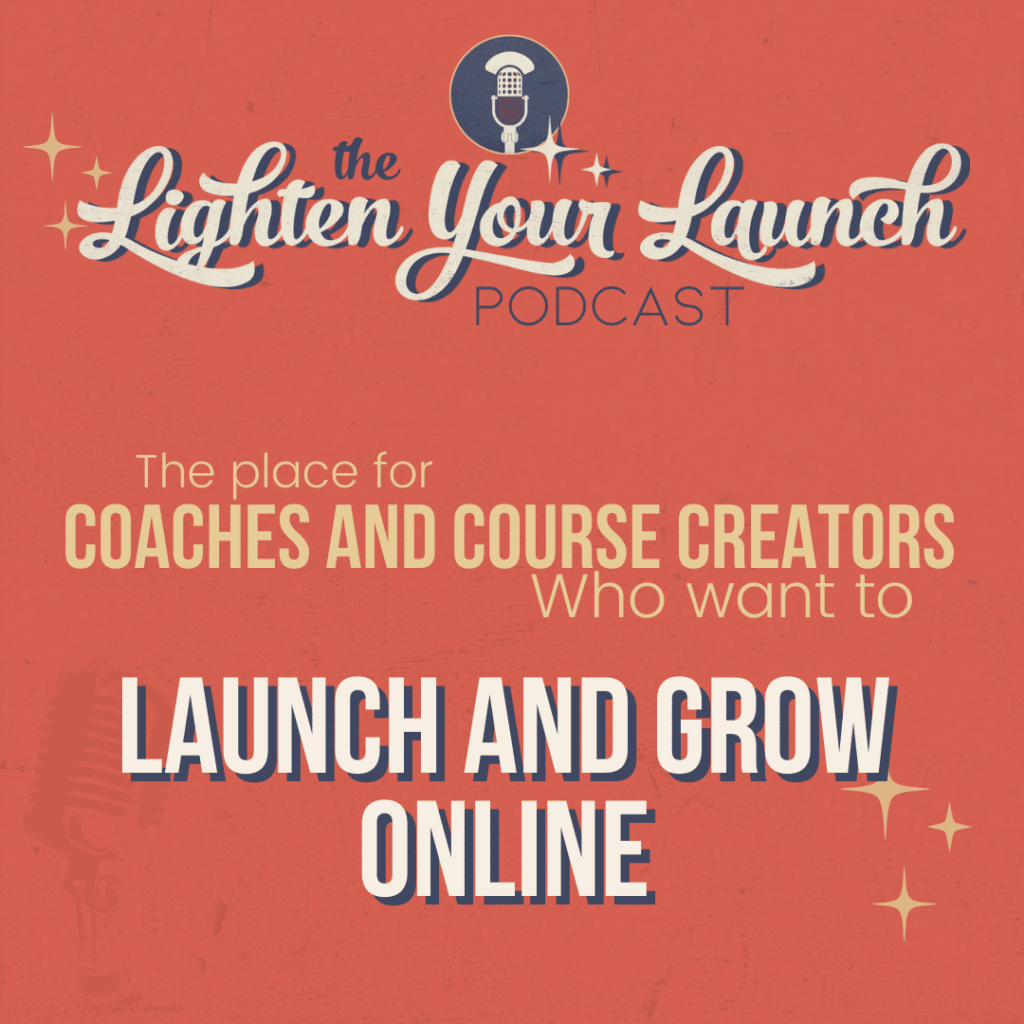
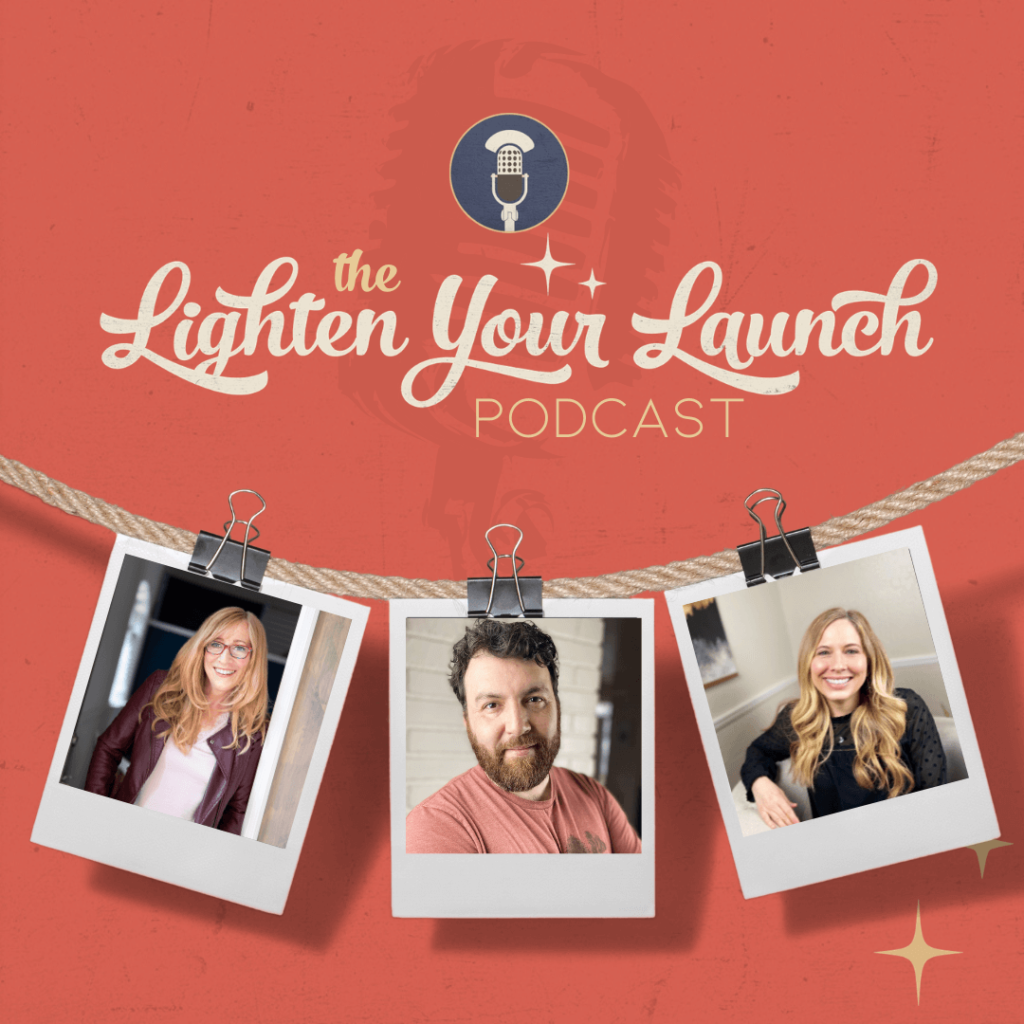


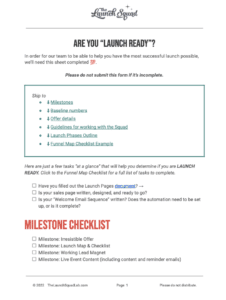
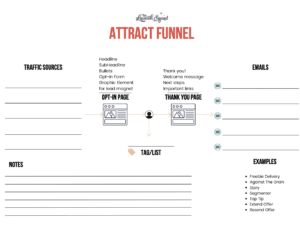
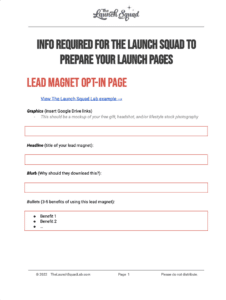

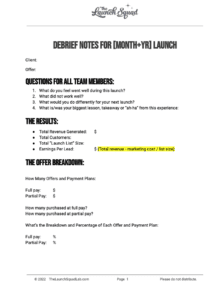
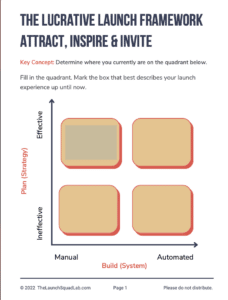
![Marketing Launch Calendar [TEMPLATE]](https://thelaunchsquadlab.com/wp-content/uploads/2023/05/Marketing-Launch-Calendar-TEMPLATE-300x260.png)
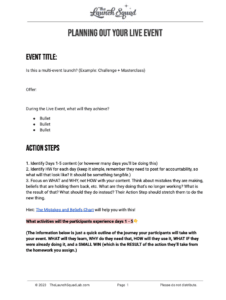

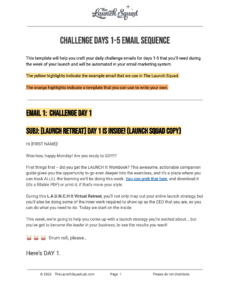
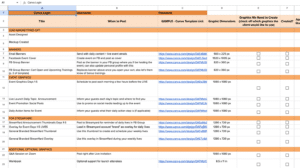
![[Updated] Email Templates for Launch](https://thelaunchsquadlab.com/wp-content/uploads/2023/05/Updated-Email-Templates-for-Launch-223x300.png)
![[REVISED] LS Pitch Script](https://thelaunchsquadlab.com/wp-content/uploads/2023/05/REVISED-LS-Pitch-Script-2023-226x300.png)

